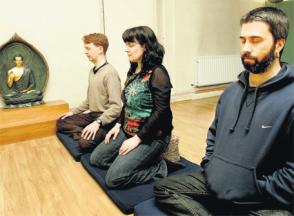THE POWER OF SILENCE…
April 7 2008
DUBLIN, Ireland – Prayer, I’ve heard it said, is the act of talking to God, while meditation is the act of listening to him.
 << Masterminds: Meditation focuses on ancient breathing techniques
<< Masterminds: Meditation focuses on ancient breathing techniques
I found this take on meditation fascinating when I came across it recently. So much so that my dread of the spiritual practice lessened and a bubble of newfound curiosity came into my consciousness.
When it comes to meditation, I’ve always been an abysmal failure. Lately, I’ve comforted myself with the idea that nature is my meditation: deposit me by the sea and I couldn’t be happier and more present. But with this new spark of curiosity, the time is now, and off I head to give meditation one more go.
Maybe at last I’ll advance to becoming part of the blissed-out meditation gang I’ve envied for so long. Who better to get insights and hints from than the experts.
In a new premises on James Joyce Street, the Dublin Buddhist Centre runs regular meditation courses and has a great reputation.
Joining late in the course, I’m given a crash course by the teacher Vajrahsura on how best to sit — crossed-legged or straddling yoga blocks (calves tucked under thighs) with a straight spine and my palms face down on my lap — before 15 or so of us head into class.
“You can’t stop the waves but you can learn how to surf,” Vajrahsura says. “Life happens and while you can’t control it, you can control your response to it. Through meditation you learn the patterns and habits of your mind and, with practice and discipline, you start to cultivate new, more patient and positive ways of being.”
The first practice in tonight’s two-and-a-half hour class is tailor-made for me. Called ‘formless meditation’, it entails letting your thoughts do what they do — the only hitch is that you just notice them without judgment.
“The best way to control a wild bull is to give it a big field. It’ll run itself out,” Vajrashura says. Given free reign, my mind is like dozens of runaway trains with a fireworks display going off in each. A host of thoughts, from lists of what needs to get done to people to call, hurtles through my mind. It’s far from relaxing. I’m delighted to hear my neighbour has similarly important topics on his mind: would he get a Chinese or an Indian tonight? Is Desperate Housewives on?
Far from seeing this as a failure, Vajrahsura deems it a success. Becoming aware of the manic state of my mind is the first step towards change.
This ‘formless’ practice is used with focal practices such as ‘the Mindfulness of Breathing’ and ‘Development of Loving Kindness’ or Metta Bhavana, practiced by Buddhist monks for 2,500 years. “The first, the mindfulness of breathing involves sitting and watching the breath — not doing anything to alter the breath or worrying about whether its right or wrong or being too concerned about when the mind inevitably wanders. This practice helps to develop a greater awareness of ourselves and the world around us, to calm the mind and integrate the energies,” says Vajrahsura.
“The second practice, Metta Bhavana, takes that energy and directs it towards the cultivation of positive emotions in that it helps us develop feelings of loving kindness towards ourselves and others.”
The evening ends with the breathing meditation and is an enjoyable 20 minutes. The wild bull ran itself out for the evening and this time moseys around the field chewing grass.
The verdict: The Buddhist belief that there is no such thing as bad meditation is encouraging. Everyday since the class, I’ve found myself a little corner to do a few minutes of breathing meditation. Sometimes my mind is wild, sometimes it’s judgmental and other times, it waits patiently for God to speak.
A five-week meditation course at the Dublin Buddhist Centre costs €150 (€95 for unwaged). To enroll, call 01 817 8933.
– Editor’s note: While Buddhists understanding of the concept of god is fundamentally different from that of the Abrahamic faith, we accept in good spirit the writer’s context and experience in relation to using meditation techniques as a means to understand “God”.
By Naimh Hooper
Source : The Independent (Ireland)




